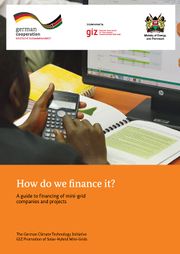Mini-Grid Financing
Overview
and basic recommendations for securing various forms of financing for the most relevant types of mini-grid businesses and projects in Kenya. It serves to provide an overview of mini-grids and the key financing concepts and procedures that developers should consider when developing mini-grid projects. The handbook eases the understanding of the most relevant aspects of financing mini-grids and sheds light on the financing process, options and timings for project developers. It presents an overview of typical (simplified) investment cases, giving corresponding illustrations of tariff structures and key considerations for financing methods for each case.
The guidebook is targeting (prospective) mini-grid developers who seek to get a general understanding of financing a mini-grid in Kenya, but can also serve as a reference to other stakeholders. It therefore offers a general introduction to mini-grid financing in Kenya and is not targeting mini-grid financing experts and companies already engaged with financing mini-grids.While this handbook intends to display the required knowledge for mini-grid financing, mini-grid projects are very site specific. The authors of this handbook, therefore, do not accept any liability for commercial or investment decisions taken on the grounds of the knowledge presented within.
The handbook is the most recent addition to a series of publications by ProSolar for mini-grid practitioners, coming after a practical guide to mini-grid site selection, licensing and sizing.
Table of Contents
Link of the guidebook: Mini-Grid Financing Guidebook
- Introduction 10
- Understanding Mini-Grid Financing 12
2.1. Basic Finance Principles 12
2.2. Corporate vs. Project Financing 14
2.3. The Different Pools of Money in Global Finance 15
2.4. Types of Financing and their Considerations 21
2.5. Stages of Financing 23
2.6. Types and Timing of Financing for Mini-grid Projects 28
2.7. What Investors Value in Companies they Invest In 30
3. Kenya Mini-Grid Market Overview 34
3.1. Market size and relevant actors 34
3.2. Framework conditions 35
3.3. Financing Mini-Grids in Kenya 37
4. Solar-Hybrid Mini-Grid Business Models and Cost-structures 40
4.1. Case 1 - Micro-Grid 43
4.2. Case 2 - Isolated Mini-Grid 47
4.3. Case 3 - Small Power Distributor 51
5. How to Apply for and Secure Financing for Mini-Grid Developers 56
5.1. Financing Steps for Mini-grid Developers 57
5.2. Challenges for securing finance 72
6. Conclusion 73
Annex 75
Further Information
This guidebook has been developed as part of a series of handbooks on mini-grids. You can access the other ones on the following web pages:
- GIZ-ProSolar. What size shall it be? A guide to mini-grid sizing and demand forecasting. August 2016.
- GIZ-ProSolar. How do we license it? Lessons learned from the application for power generation and distribution for the Talek Power Solar Mini-Grid project. July 2015.
- GIZ - ProSolar. Where shall we put it? Solar mini-grid site selection handbook. June 2014.
- ProSolar 2016 fact sheets: ProSolar project, Mini-Grids Result Based Funding (RBF) project.




















